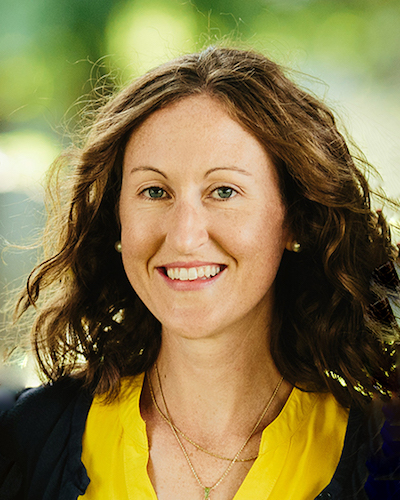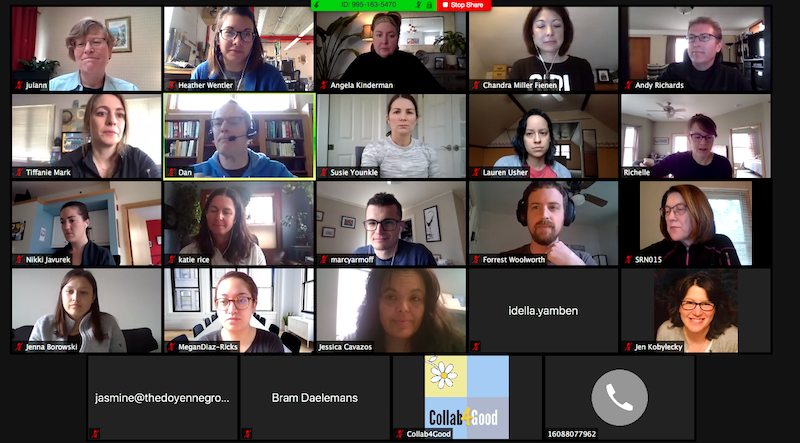
IN THE SPOTLIGHT: Michelle Goetsch knows what’s wrong with the recycling industry, and she’s building a solution
By Olivia Barrow
The life of a startup founder is defined by constant change during the best of days. So while the rest of us get rocked by a pandemic, founders like Michelle Goetsch are pretty well prepared for the rollercoaster ride this past six weeks has been.
COVID-19 is not slowing down Michelle and her team from working to help people recycle and compost correctly. Her company, Betterbin, is developing a web app that helps consumers know what items they can recycle and compost and how to avoid mistakes that cost them — or their local waste management provider — a lot of money.
The app is powered by a machine learning-driven proprietary database of products, packaging materials and location-specific recycling and composting rules. This massive undertaking has actually benefited from the extra time generated by the life-slowdown created by COVID-19. I originally interviewed Michelle in January, when her company was still called ERbin. We caught up again in early April to get the latest on her journey. She’s a badass and I can’t wait to use her app to lower my carbon footprint!
Tell me your founder’s story. How did this all start?
I’m passionate about everything in life, but especially environmental responsibility. I was in my kitchen one day, and I got so frustrated that I didn’t know if I was recycling right. I’m smart and proactive about trying to do the right thing, and if I don’t know how to do it right, then no one does.
I applied for an Ideadvance Seed Fund grant. I’m a technical writer by trade, so writing a grant was not difficult. I just said I think I have a solution — everyone should have recycling info at their fingertips.
Ideadvance has you interview a ton of people to understand if you’ve really found a problem that even exists. At the time, my brother was my co-founder. We interviewed 200-plus people in the material recovery industry and general consumers about recycling pain points. We came to the conclusion that there was a problem here.
Until I got that grant, I had no idea someone might think it was worthwhile to build a business around this.
Why is recycling so complicated?
One of the biggest problems with U.S. recycling infrastructure is that recycling varies based on where your waste goes. In Madison, the two largest haulers have different processing facilities and differentiation between what materials they accept. They each have different commodity buyers for their recovered materials, which is what differentiates their recycling guidelines.
What has gone so wrong with the labeling on packages is that markets change a lot in terms of what manufacturers want or need to make their products out of. Fibers, scrap metal, plastic resin — at any given moment these materials might be acceptable, but then in six months no one wants them. The data in our app can pivot on a dime to reflect those changes, unlike the recycling instructions printed on the packaging.
And brands hate messing with their packaging. It costs them a lot of money to change anything.
Have you learned unsettling things about recycling?
The hardest thing I’ve learned is that economics dictates the success of recycling. In the state of Wisconsin, it’s often cheaper for companies to throw something in the landfill than it is to recycle it. Does that mean they’re taking into consideration the long term costs of environmental degradation like mining for raw materials? No, but right now it’s cheaper to throw it away.
I hate that point-in-time economics dictates what gets recycled.
Tell me more about the database that supports your web app?
It’s a proprietary database that no one has built before. It starts at your product, for example a Clif Bar box. We know what material the box is made out of, who accepts it, and how to tell you if it’s acceptable for recycling or not based on where you live.
There are huge databases that exist to manage product info. We are able to access those, sometimes for free, sometimes for money, and sometimes we work directly with the brand.
Then we work directly with material recovery facilities to understand exactly how they want specific packaging types. And then we use a combination of human data entry and machine learning to pull everything together.
What’s your vision for the company beyond the app?
This database will be the backbone for multiple products. Imagine a service like Instacart — if you purchase 25 products, they could tell you exactly how to dispose of those products based on where you live. If you go to the grocery store, on the receipt, it might tell you how to properly dispose of each item based on where you live.
We also see a lot of opportunities in composting and food waste prevention. There’s a lot of legislation happening now that’s going to require organic waste diversion. They’re creating markets for us. It’s already big on the east and west coasts.
What’s your business model right now and how is that evolving?
We sell annual subscriptions to the app, whether it’s for recycling or food waste, to an oversight organization. That might be a municipality, a college campus, or an office building. When they have access to our app, it gives free access to the residents they serve. The app takes the place of a website or flyer that shows you what to recycle or compost and how.
In addition to that, we have sponsors who sponsor in any given community. In Weston, WI (a beta test site), we have both the Marathon County Solid Waste Department and Advanced Disposal sponsoring the app. When we grow into Wausau, Rocket Industrial, a packaging solutions provider, has expressed interest in having their logo be the face of the app in Wausau for advertising purposes.
Our long term revenue generation is all about selling access to our data. When we have this complete database built of product and location-specific recycling/food waste instructions, we want to sell it to grocery retailers so that a person can leave any grocery purchasing experience with accurate recycling, composting and food waste prevention instructions, based on where the person lives.
What’s the status of your minimum viable product (MVP)?
We’re developing our second-generation MVP, Betterbin, which looks completely different from our first MVP, ERbin. We learned it would be difficult to get people to download an app. Even if you’re really into recycling. So we’re transitioning to a progressive web app.
How is COVID-19 impacting your progress on your roadmap?
It has bought us some time, which has actually been very helpful. Despite transitioning from our initial MVP to this second generation web app, we never stopped selling. We’re going to do a test implementation in Charlottesville, VA, once COVID-19 is over, specific to recycling. That’s a really exciting partnership. They understand we are a startup, and they’re excited to help shape the second-generation product based on their user experiences.
We’re also moving forward on a partnership with the City of Madison for a residential composting program. We’re just waiting on the Safer-At-Home order to lift. When the order lifts, we’ll start promoting the app across Madison. It will be completely free for residents to drop off food scraps at three drop-offs across the city at specific hours.
What’s it like as a startup trying to raise money right now?
Right when everything shut down, we were just about to start a crowdfunding campaign on a platform called IFundWomen, and we were going to promote it with our Project Pitch It episode. But we’re on pause with the crowdfunding campaign because I didn’t feel comfortable with it. There are bartenders and servers out there doing GoFundMe’s to buy food. The last thing I want to do is try to ask people for money for our startup.
But what is still happening is we’re preparing to do our first investment raise. There are definitely still investors out there who are interested. When Safer-At-Home lifts, we can begin those in-person presentations.
What’s the biggest challenge you anticipate in scaling up the business?
Our biggest barrier is what no one has been able to do yet: get people to recycle right. You can give people information all day every day, but that doesn't immediately change their behavior. We think changing the education distribution method, as well as getting people more accurate information is a good start. We also have an incentivization strategy that focuses on giving back to communities, which will be important.
How has Doyenne supported you in your journey?
A few months ago I would have said, “Where am I going to get money?” With Doyenne you start networking, you start understanding what resources are out there, you put feelers out there, and people jump in.
This is a super exciting time for us. We have a lot of interest from multiple types of investors.
I still have a hard time thinking of myself as an entrepreneur. I just wanted to solve a problem that I am super passionate about. I had no idea what barriers I would encounter trying to get this off the ground. No one in this process has been so immediately non-judgmental and immediately supportive and willing to provide help as when I met with Amy for the first time. She didn’t know me, or the idea, but she immediately asked, “How can I help you?” That’s exactly what you need someone to do when you’re trying to start a business.
I will forever be grateful for that belief and support.

